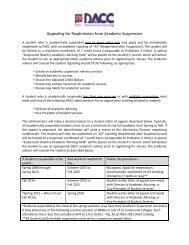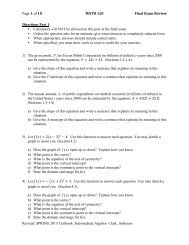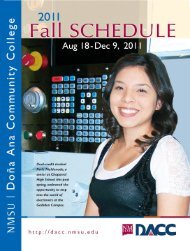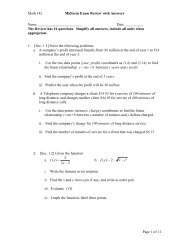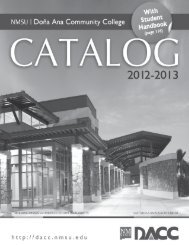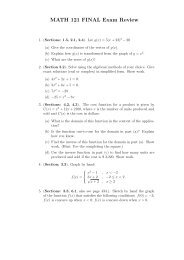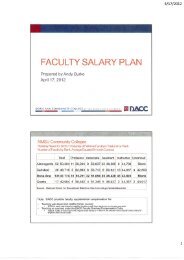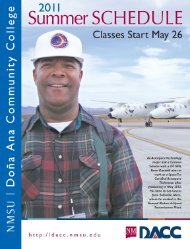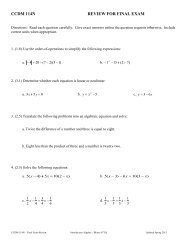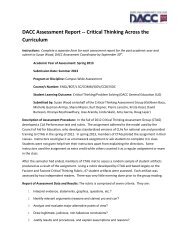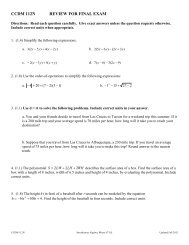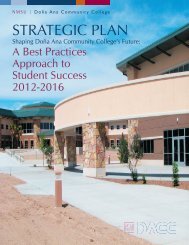online - Dona Ana Community College - New Mexico State University
online - Dona Ana Community College - New Mexico State University
online - Dona Ana Community College - New Mexico State University
Create successful ePaper yourself
Turn your PDF publications into a flip-book with our unique Google optimized e-Paper software.
L SC 204 Special Libraries and Information Centers<br />
3 cr.<br />
An examination special libraries and information centers. Topics may<br />
include management, user services, technical services, facilities, and<br />
types of collections.<br />
L SC 205 Preservation Basics for Libraries<br />
1 cr.<br />
Basic preservation tools and techniques for library sources.<br />
L SC 210 Computer Applications in Library and Information Centers<br />
I 3 cr.<br />
Overview of computer applications in libraries and information centers,<br />
including automated systems and electronic resources; introduction to<br />
evaluation and planning of technology.<br />
L SC 220 Computer Applications in Library and Information Centers<br />
II<br />
3 cr.<br />
For library and information specialists, provides theory and practice of<br />
more specialized knowledge required for those who would like to work<br />
as information managers at the level of system administration.<br />
L SC 221 Cooperative Experience I<br />
1-3 cr.<br />
Student is employed in an approved work site and rated by the employer<br />
and instructor. Each credit requires a specified number of hours of onthe<br />
job work experience. Prerequisite: consent of instructor. Restricted<br />
to majors. Graded S/U.<br />
L SC 222 Cooperative Experience II<br />
1-3 cr.<br />
Continuation of L SC 221. Each credit requires specified number of<br />
hours of on-the-job work experience. Prerequisite: L SC 221 and consent<br />
of instructor. Restricted to majors. Graded S/U.<br />
L SC 230 Issues and Ethics in Libraries and Information Centers. 3 cr.<br />
Discussions of current and continuing challenges to effective library and<br />
information service. Topics may include copyright, censorship, intellectual<br />
freedom, Internet filtering, problem patrons, security, or other<br />
current issues.<br />
L SC 231 Copyright Basics for Libraries<br />
1 cr.<br />
Copyright definitions and ways that copyright may affect library service.<br />
L SC 232 Disaster Planning for Libraries<br />
1 cr.<br />
Preparing for and responding to library disasters.<br />
L SC 233 Library Privacy and Confidentiality<br />
1 cr.<br />
Covers the USA Patriot Act and other laws that apply to library user<br />
privacy.<br />
L SC 234 Libraries, Access, and Intellectual Freedom<br />
1 cr.<br />
Philosophical and practical information related to library policies on<br />
access.<br />
L SC 235 Library Security and Safety<br />
1 cr.<br />
Strategies for safety and security issues in libraries.<br />
L SC 240 Internet Resources and Research Strategies<br />
3 cr.<br />
Introduction to retrieving and evaluating information found on the Internet<br />
and in selected Internet-accessible databases.<br />
L SC 250 Reference and Information Resources II<br />
3 cr.<br />
Evaluation and use of specialized information resources (print and electronic)<br />
in areas such as business, law, medicine, the sciences, social<br />
sciences, and government documents.<br />
L SC 255 Special Topics<br />
1-3 cr.<br />
Special topics to be announced in the Schedule of Classes. May be repeated<br />
for a maximum of 12 credits.<br />
L SC 260 Advanced Cataloging for the Library Technician 3 cr.<br />
Introduction to cataloging of various non-book formats and use of<br />
MARC tags.<br />
L SC 261 Government Documents<br />
1 cr.<br />
An introduction to government documents and the SuDoc classification<br />
system.<br />
L SC 262 <strong>State</strong> and Local Documents<br />
1 cr.<br />
An introduction to state and local documents in library collections.<br />
L SC 265 Cataloging Music Materials<br />
3 cr.<br />
Overview of the basics of cataloging music materials including scores,<br />
CD’s, videos, and DVD’s using AACR2 and MARC coding. Designed for<br />
the cataloger with little or no music cataloging experience.<br />
L SC 270 Library Science Capstone<br />
3 cr.<br />
A culmination of all technical courses that are required to receive and<br />
associate of applied science from the program.<br />
L SC 298 Independent Study<br />
1-3 cr.<br />
Individual studies directed by consenting faculty with prior approval of<br />
department chair. May be repeated for a maximum of 12 credits.<br />
LAWE—Law Enforcement<br />
LAWE 201 Introduction to Juvenile Delinquency<br />
3 cr.<br />
An introductory overview of the juvenile justice system of due process,<br />
custody, detention and release. Note: course does not meet upper division<br />
requirements towards completion of Bachelor of Science in Criminal<br />
Justice.<br />
LAWE 202 Police Patrol Procedures<br />
3 cr.<br />
A critical review of police procedures and the influences on police behavior;<br />
policy development, including the police role; discretion; police<br />
community interaction and arrest, search and seizure.<br />
LAWE 203 Introduction to Police Supervision 3 cr.<br />
Introductory overview of police supervision and concerns as it applies<br />
to law enforcement. Note: course does not meet upper division requirements<br />
towards completion of Bachelor of Science in Criminal Justice.<br />
LAWE 204 Introduction to Aspects of Correction<br />
3 cr.<br />
Issues affecting correction practices and inmates. Note: course does not<br />
meet upper division requirements towards completion of Bachelor of<br />
Science in Criminal Justice.<br />
LAWE 205 Crime in America<br />
3 cr.<br />
A look at the American crime problem in a historical perspective including<br />
factors affecting the distribution of crime trends, crime prevention<br />
tactics and new <strong>Mexico</strong> crime trends. Note: course does not meet upper<br />
division requirements towards completion of Bachelor of Science in<br />
Criminal Justice.<br />
LAWE 206 Systems and Practices in Corrections<br />
3 cr.<br />
An introduction to analysis and examination practices of control and<br />
treatment of offenders. Note: course does not meet upper division requirements<br />
towards completion of Bachelor of Science in Criminal Justice.<br />
LAWE 207 Rights of Prisoners<br />
3 cr.<br />
Introduction to the legal rights and due process of the offender from the<br />
onset of arrest to conviction. Note: course does not meet upper division<br />
requirements towards completion of Bachelor of Science in Criminal<br />
Justice.<br />
LAWE 220 Cooperative Experience<br />
3 cr.<br />
Supervised cooperative work program. Student is employed in an approved<br />
law enforcement occupation and rated by the employer and instructor.<br />
Prerequisite: consent of instruction.<br />
LAWE 221 Law Enforcement Internship<br />
3 cr.<br />
Application of knowledge, skills and abilities, in an agency as an intern<br />
and integrated member of a law enforcement affiliated agency. Prerequisite:<br />
consent of instruction.<br />
LING—Linguistics<br />
LING 200G Introduction to Language<br />
3 cr.<br />
Traditional fields of language study (sound, grammar, meaning) and<br />
newer ones (language as social behavior, language and cognition, language<br />
variation, animal communication).<br />
MATH—Mathematics<br />
The basic skills requirement in mathematics may be met by earning a<br />
grade of C or higher in both MATH 111 and MATH 112, or in any lowerdivision<br />
mathematics course numbered 120 or above. For other options,<br />
see Basic Academic Skills in the General Information chapter.<br />
A student may not receive credit for a lower-division mathematics<br />
course if it serves as a prerequisite to a lower-division math course that<br />
the student had previously passed with a grade of C or better.<br />
NOTE: Students without an adequate placement score to enroll in MATH<br />
111, MATH 120 or MATH 210G can gain admission to the course by<br />
earning a C or better in CCDM 114N at an NMSU branch campus.<br />
Students wishing to enroll in MATH 121, 142G, 180, 191, 230, 235,<br />
279, 280, or STAT 251 must satisfy one of the following: (a) have passed<br />
2 0 0 7 - 2 0 0 8 C A TA L O G<br />
77



